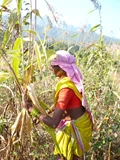
FAO Director-General, QU Dongyu, has called for increased collaboration within the G20 nations as global hunger persists at alarming levels. Speaking at the G20 Agriculture Working Group (AWG) Ministerial Meeting in Chapada dos Guimarães, Brazil, Qu highlighted that 733 million people worldwide still face hunger, underscoring that the world remains far from achieving Sustainable Development Goal 2 (Zero Hunger).
Qu highlighted that while some progress has been made in Latin America and the Caribbean, hunger continues to rise in Africa and remains stagnant in Asia. He attributed this to the combined effects of climate change, economic instability, and conflict, which are causing food crises of a scale unseen in recent years.
Qu cited Sudan as an example, where over 25 million people faced acute food insecurity between June and September. Similar crises are present in Gaza, Afghanistan, Myanmar, South Sudan, Pakistan, Haiti, and Nigeria, where millions face dire food shortages. "We cannot fail them," Qu said, urging for increased food assistance along with strategies that protect the environment and create sustainable incomes for farmers.
He stressed the vital role of family farmers, who constitute over 90% of the world’s farms, occupy 70-80% of farmland, and produce more than 80% of global food. Transforming agrifood systems to be more efficient, inclusive, resilient, and sustainable will require stronger political commitments and social agendas, especially to support family farmers, Indigenous Peoples, and small producers.
Qu highlighted the importance of G20 cooperation, pointing to the success of the Agricultural Market Information System (AMIS), a crucial FAO-hosted tool for global agricultural market coordination. He also commended Brazil for its efforts in promoting food security at the G20 and advancing the Global Alliance Against Hunger and Poverty.
FAO is supporting this initiative by hosting its Support Mechanism in Rome and contributing to its three key pillars.
















